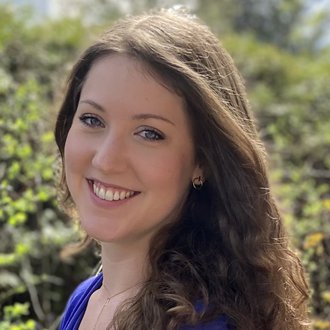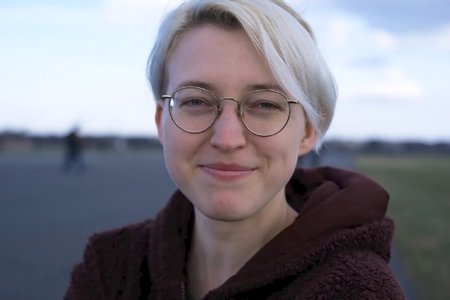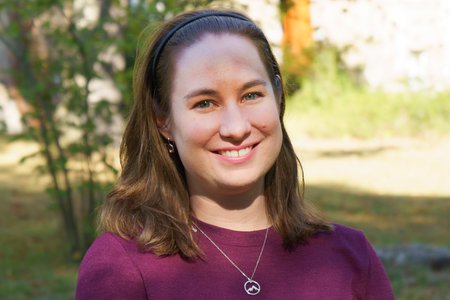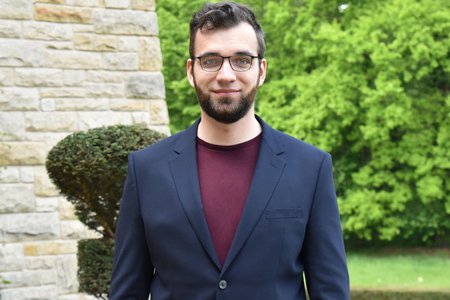Carl Ramsauer Award for Maria Werhahn
Dr Maria Werhahn receives the Carl Ramsauer Award 2023 of the Physikalische Gesellschaft zu Berlin e.V. for her outstanding doctoral thesis at the Leibniz Institute for Astrophysics Potsdam (AIP) and the University of Potsdam.
The award-winning dissertation entitled “Simulating Galaxy Evolution with Cosmic Rays: The Multi-Frequency View” addresses the role of cosmic rays in shaping the interstellar medium of galaxies, impacting their evolution, and influencing their star formation efficiency. Due to the inability to directly measure cosmic rays in distant galaxies, scientists can only indirectly constrain their properties via the radiation they emit. Hence, Maria Werhahn developed a numerical framework to model cosmic ray spectra in galaxies and their related emission processes ranging from radio wavelengths to very high-energy gamma rays.
“Through high-resolution magneto-hydrodynamical simulations of galaxies, I compared these results to observations, successfully reproducing observed cosmic rays and emission spectra as well as relations between radio and gamma-ray luminosities with far-infrared emission, providing insights into transport properties of cosmic rays”, explains Maria Werhahn. She adds: “I am delighted and honoured to be awarded this prize. I would also like to thank my thesis supervisor, Christoph Pfrommer, and my colleagues at the AIP, without whom this work would not have been possible”.
“It is very remarkable that Dr Werhahn has succeeded in developing a unified model that reconciles local observations of cosmic rays with radio and gamma rays from distant galaxies and enables us to better understand the physics of galaxy formation,” says Professor Christoph Pfrommer, head of the Cosmology and High-Energy Astrophysics section at AIP, in recognition of the work.
The Carl Ramsauer Award 2023 will be awarded during a festive colloquium. The four winners will present their outstanding work. The award ceremony will take place on Wednesday, 22 November 2023, at 5:15 pm at the Technische Universität Berlin, Eugene-Paul-Wigner Building, Lecture Hall EW201, Hardenbergstr. 36, 10623 Berlin.
The Physikalische Gesellschaft zu Berlin awards the Carl Ramsauer Award in honour of the experimental physicist Carl Ramsauer (1879-1955). Since 2002, four outstanding doctoral theses in physics and related fields have been awarded each year at Freie Universität Berlin, Humboldt-Universität zu Berlin, Technische Universität Berlin and the University of Potsdam, and since 2022 also at Brandenburg Technical University Cottbus-Senftenberg. The Carl Ramsauer Award has been sponsored by the company SPECS GmbH since 2015.
Further information
Information on the Carl Ramsauer Award at the Physikalische Gesellschaft zu Berlin
Dr Maria Werhahn receives the Carl Ramsauer Award 2023 of the Physikalische Gesellschaft zu Berlin e.V. for her outstanding doctoral thesis at the Leibniz Institute for Astrophysics Potsdam (AIP) and the University of Potsdam.
The award-winning dissertation entitled “Simulating Galaxy Evolution with Cosmic Rays: The Multi-Frequency View” addresses the role of cosmic rays in shaping the interstellar medium of galaxies, impacting their evolution, and influencing their star formation efficiency. Due to the inability to directly measure cosmic rays in distant galaxies, scientists can only indirectly constrain their properties via the radiation they emit. Hence, Maria Werhahn developed a numerical framework to model cosmic ray spectra in galaxies and their related emission processes ranging from radio wavelengths to very high-energy gamma rays.
“Through high-resolution magneto-hydrodynamical simulations of galaxies, I compared these results to observations, successfully reproducing observed cosmic rays and emission spectra as well as relations between radio and gamma-ray luminosities with far-infrared emission, providing insights into transport properties of cosmic rays”, explains Maria Werhahn. She adds: “I am delighted and honoured to be awarded this prize. I would also like to thank my thesis supervisor, Christoph Pfrommer, and my colleagues at the AIP, without whom this work would not have been possible”.
“It is very remarkable that Dr Werhahn has succeeded in developing a unified model that reconciles local observations of cosmic rays with radio and gamma rays from distant galaxies and enables us to better understand the physics of galaxy formation,” says Professor Christoph Pfrommer, head of the Cosmology and High-Energy Astrophysics section at AIP, in recognition of the work.
The Carl Ramsauer Award 2023 will be awarded during a festive colloquium. The four winners will present their outstanding work. The award ceremony will take place on Wednesday, 22 November 2023, at 5:15 pm at the Technische Universität Berlin, Eugene-Paul-Wigner Building, Lecture Hall EW201, Hardenbergstr. 36, 10623 Berlin.
The Physikalische Gesellschaft zu Berlin awards the Carl Ramsauer Award in honour of the experimental physicist Carl Ramsauer (1879-1955). Since 2002, four outstanding doctoral theses in physics and related fields have been awarded each year at Freie Universität Berlin, Humboldt-Universität zu Berlin, Technische Universität Berlin and the University of Potsdam, and since 2022 also at Brandenburg Technical University Cottbus-Senftenberg. The Carl Ramsauer Award has been sponsored by the company SPECS GmbH since 2015.
Further information
Information on the Carl Ramsauer Award at the Physikalische Gesellschaft zu Berlin
Images
Dr Maria Werhahn.





